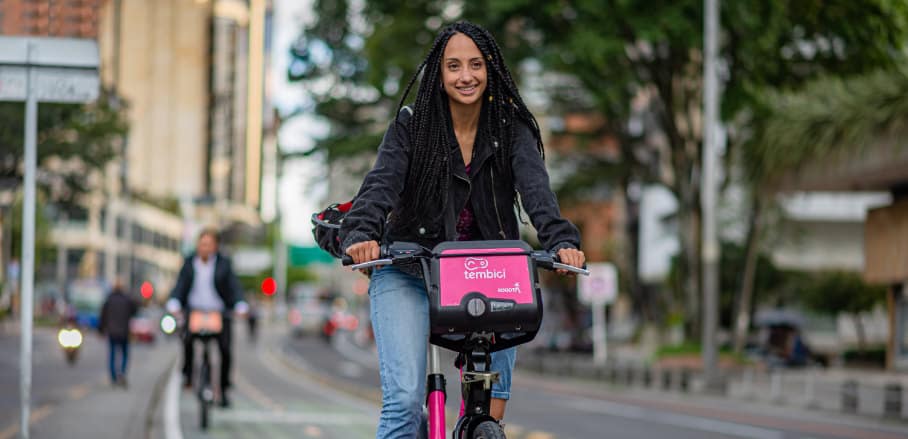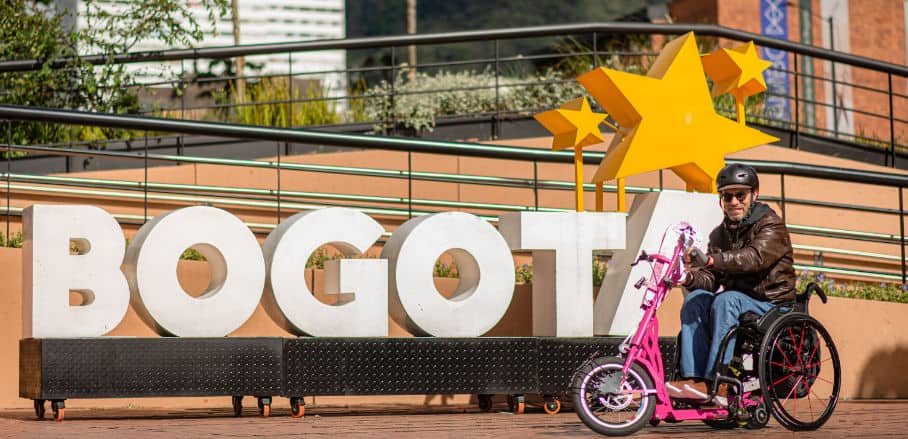Pedalling Towards a Sustainable and Inclusive Future: Bogotá’s Bike-Share Success Story
How can cities move beyond fossil fuel-driven transportation systems? Bogotá’s bike-share programme demonstrates that sustainable mobility is sometimes just a pedal step away. Laura Simsek and Carolina Hernandéz G. highlight how the initiative’s inclusive components help close the mobility gap, promote gender equality, and simultaneously foster a just transition in Colombia’s capital.
For residents in the Colombian capital – home to 7.2 million citizens – getting around the city is not an easy task. According to the 2022 INRIX Global Traffic Scorecard, the average Bogotá resident loses approximately 122 hours per year due to traffic, which is the equivalent of five full days stuck in congestion per resident! Bogotá is thus currently 6th in the global congestion ranking, between New York City (5th) and Toronto (7th).
Thus, it’s perhaps not surprising that tens of thousands of Bogotá residents took to the streets to try out the city’s newest mobility initiative. In September 2022, the City of Bogotá unveiled its new bike-share system at a concert of the British pop-rock band Coldplay. Based on Coldplay’s sustainability initiatives (water, energy, travel, and nature), local artists designed four bicycles that were presented in an exhibition at the El Campín Stadium during the concerts. The designer bikes will become part of a system of 3,000 bikes in Bogotá. With over 96,000 rides in the first three months of operation, the system has already exceeded operator Tembici’s expectations by far.
Designing a Sustainable Mode of Transportation For Those Who Are Easily Overlooked
The new bike-share initiative is making waves with its innovative and inclusive approach to adopting green mobility options. Urban cycling not only promotes sustainability but also provides an inclusive mode of transportation for all residents. Supported in the planning phase by the C40 Cities Finance Facility (CFF), the bike-share system offers accessible and affordable transportation for all residents, regardless of their physical abilities, age, or gender.
At the heart of the programme’s success is its focus on accessibility and inclusivity. More than 425 individuals of different ages and ethnic groups – 54 per cent of whom were female – participated in the diagnostic processes during the project’s planning phase to identify gender gaps in bicycle use (see the CFF Impact Brief for more information). The lessons learned from mainstreaming the gender perspective in the bike-share project can be found here.
As a result, the bike-share system provides accessible memberships to all of Bogotá’s residents and offers bikes with features that accommodate a variety of different needs. This includes hand-bikes to increase accessibility for riders with special needs, box bikes to facilitate the transport of goods, attachable child seats, assisted-pedalling bikes for longer distance rides that may be difficult to do on a traditional bike, as well as a video in sign language explaining the system.
They are all part of the system’s approach to enable a means of sustainable transport for those whose needs are often overlooked, and who are yet the most vulnerable to the effects of climate change – women, children, the elderly, and persons with disabilities.
“The incorporation of the hand-bike into the bike-share system represents a momentous stride forward. As a hand-bike user, I have gained the ability to traverse greater distances, achieve a higher degree of societal reintegration, and ultimately enjoy a heightened sense of independence. This marks a substantial advancement in the pursuit of truly inclusive and accessible mobility for all.”
Gustavo Martinez, a civil engineer and urban designer, has worked in the mobility department of Bogotá, promoting the inclusion of persons with disabilities. Gustavo is a wheelchair user and a user of the bike-share system.

A woman riding a share bike in Bogotá. © Secretaría Distrital de Movilidad de Bogotá, 2022.
Turning the City Into a Safer Space for Women
In addition, bike-sharing can make public spaces in the city safer. Women are especially empowered to move around more independently. In Bogotá, a city with a high crime rate, women often feel unsafe waiting at bus stops or walking long distances alone. Promoting public access to share bikes at 300 rental stations around the city can make public spaces more welcoming for women, helping to shape a more gender-inclusive city. Public bikes are also less likely to be stolen, which decreases the risk of being robbed.
Diverse populations, particularly regarding gender, play a crucial role in the transition toward a more sustainable and equitable future. By proactively including women and traditionally left-behind groups in the transition toward green mobility, the shift in the population’s view of transportation can be accelerated. These groups can serve as role models in the fight against climate change and pass on a green mindset to fellow citizens. This, in turn, can help to create a more robust and inclusive approach to both mitigation and adaptation efforts, as more women and other groups such as persons with disabilities, the elderly, and children are given a voice and a seat at the table in decision-making processes.
Sustaining the Cycling Momentum in Bogotá: Strategies for Success
Through bike-sharing, citizens can benefit from decreased traffic congestion, reduced greenhouse gas emissions, improved health, a better quality of life, and reduced road infrastructure costs.
To further promote cycling in Bogotá and make the city safer for cyclists, a multi-faceted approach is required. By providing knowledge about the cycling system, improving safety measures, addressing security concerns, and ensuring proper maintenance, Bogotá can maintain the momentum of its cycling promotion efforts. Additionally, guidelines and best practices can be shared with other cities in the country and region, providing input for national governments and serving as a model for replication in smaller cities. Finally, exploring viable business models and conducting calculations can help to ensure the sustainability and success of these efforts.
With its focus on accessibility and inclusivity, Bogotá’s bike-share initiative is making a real difference in the lives of the city’s residents and helping to create a more sustainable and just future for all.
